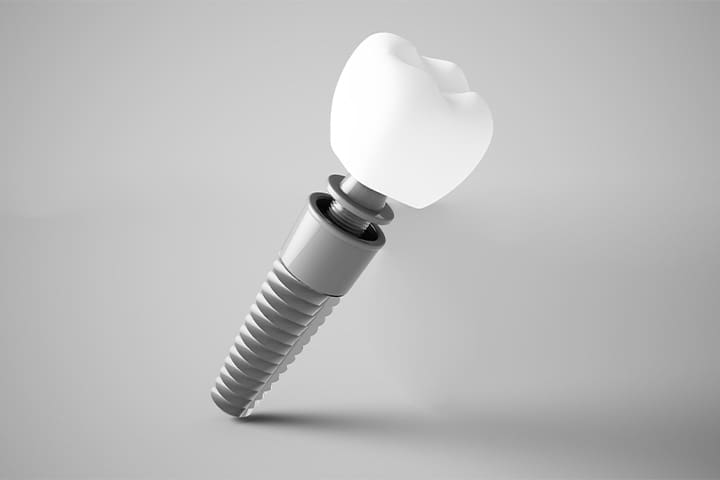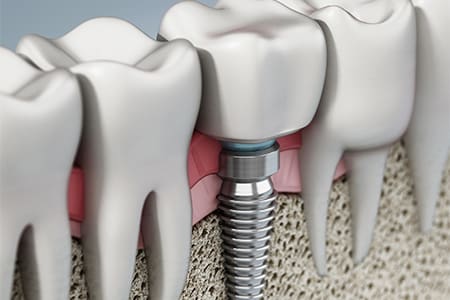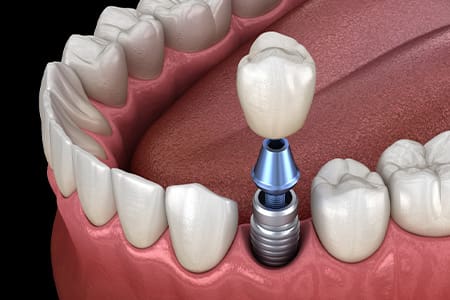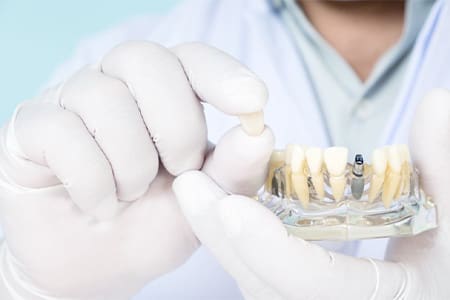A Permanent Option for Tooth Replacement

Traditional bridges and dentures can be used to replace missing teeth, but what if you want a more permanent solution? Dental implants can last a very long time with the right maintenance. On top of that, many dentists and patients see them as the next best thing to natural teeth! At Weston Dental Specialists Group, our team can personally handle every step of the dental implant process. Call us today to start on the path toward rebuilding your smile!
Why Choose Weston Dental Specialists Group for Dental Implants?
- Start-to-Finish Dental Implant Procedures
- Skilled Periodontist and Knowledgeable Prosthodontists
- Team That Prioritizes Comfort and Convenience
What Are Dental Implants?

There are three main parts of a dental implant: the post, the prosthesis, and the abutment. The post is shaped like a screw and is surgically inserted into the jawbone, allowing it to fulfill the same functions as your natural tooth roots. Meanwhile, the prosthesis is the crown, bridge, or denture that will be used to replace your missing teeth. Finally, the abutment is the metal connector piece that will keep your prosthesis firmly anchored to the implant posts so that it doesn’t slip when you don’t want it to.
The 4-Step Dental Implant Process

If you’re nervous about getting dental implants, it can help to learn more about how the process works. Rebuilding a patient’s smile with sturdy implant posts involves four main steps, and our team is able to complete all of them in-office, meaning you can avoid the inconvenience of needing to drive to a separate specialist. Below is an overview of what you can expect to happen when you commit to having dental implants placed to fill in the empty space in your grin.
Initial Dental Implant Consultation

At your initial dental implant consultation, our team will complete a thorough examination of your mouth. We’ll confirm how many teeth need to be replaced and take a look at all of the relevant facial structures. Then we’ll help you determine whether dental implants are the best option for revitalizing your smile. We will also confirm whether any preliminary procedures are needed before we can move on to the next stage of the dental implant process; such procedures can include bone grafting and gum disease treatment.
Dental Implant Surgery

For the sake of your comfort, we’ll begin your dental implant surgery by numbing your mouth with a local anesthetic. Then we’ll create a small incision in your gums so that we can work with the underlying bone. The implant posts will be inserted at precisely chosen locations in your jaw at specific angles. Once all the posts are in place, your gums will be sutured shut so that they have a chance to heal. Protective caps will be attached to the implants; this keeps the posts safe and helps the gums maintain their shape.
Dental Implant Osseointegration & Abutment

After you receive dental implants, a natural process known as osseointegration will begin. This is when the implant posts gradually fuse with the jawbone over the course of several months. Without osseointegration, your dental implants would lack the stability necessary to support a prosthesis. Our team will give you advice for taking care of your mouth to ensure that osseointegration goes smoothly.
Once osseointegration is done, you can receive your abutments. These are metal connector pieces that will ultimately be responsible for anchoring your replacement teeth to your implant posts. Placing the abutments will require a second surgery, albeit a smaller one.
Delivery of Dental Implant Restoration(s)

Our team will need to take impressions of your mouth after the abutments have been attached to the implant posts. These impressions will be used to design your new prosthesis, which could be a crown, a bridge, or a denture based on the extent of your tooth loss. At your final appointment, the new prosthesis will be secured to the implants, thus finally completing your new smile. Our team will make any necessary last-minute adjustments to make sure your bite is comfortable.
Benefits of Dental Implants

Compared to other forms of tooth replacement, dental implants most closely resemble your real teeth in terms of appearance and function. As such, they offer all kinds of advantages that you wouldn’t be able to enjoy with traditional bridges and dentures. Are you trying to make up your mind about whether dental implants are right for you? Here are some of the benefits of the procedure that are worth considering.
Day-to-Day Benefits

How will dental implants help improve your everyday life? Here are a few key examples:
- They’ll Let You Eat Most Foods: Since dental implants have chewing power that’s almost on par with that of natural teeth, they’re able to handle most foods. This means you’ll be able to eat almost anything you want, including foods that might give traditional denture-wearers trouble.
- They Can Improve Your Confidence: Dental implants don’t just look natural; they feel natural as well. As such, you won’t have any reason to hesitate when it comes to showing off your smile in professional and social settings.
- They Can Make It Easier to Speak Clearly: Tired of your dentures slipping when you’re trying to talk? Dental implants always stay firmly in place, so they won’t interfere with your ability to speak in a way that’s easily understood.
- They are Easy to Take Care Of: Maintaining your dental implants isn’t as complicated as you might think. In fact, you can give them the same kind of care you would give your natural teeth (as in brushing twice a day, flossing regularly, and so on).
Health Benefits

Choosing dental implants could ultimately prove beneficial for the overall health of your smile for the following reasons:
- They Can Prevent Bone Loss: Dental implants can stimulate your jawbone the same way that natural teeth can. As such, they can prevent bone loss in your jaw and help you avoid unwanted changes to the overall shape of your face.
- They Can Stop Dental Drift: Your teeth can potentially drift out of position if there’s empty space in your mouth. Fortunately, dental implants can be used to completely fill in any gaps left by missing teeth. This helps ensure that the rest of your smile stays properly aligned.
- They Do Not Require Changes to Existing Teeth: A traditional dental bridge needs to be attached to two of your natural teeth, but this can only be done after a small amount of enamel has been removed. Meanwhile, dental implants are placed directly into your jaw, so there’s no need to make alterations to the teeth you still have.
Long-Term Benefits

The value of dental implants becomes even clearer when you look at the benefits they can offer in the long term:
- They are Highly Successful: Dental implant failure is very rare. The success rate of the procedures is 95% even 10 or 20 years after the initial placement.
- They Promote Better Nutrition: Since dental implants let you eat whatever you want, they can help you maintain a more nutritious diet, which can make quite a bit of difference over the years.
- They are Very Long-Lasting: Dental implants have the potential to last for decades or even the rest of your life. As long as you take good care of your dental implants, you can expect to be able to keep them for a very long time.
Who Dental Implants Can Help

Before you can get dental implants, our team will need to make sure that you meet the following criteria:
- Your mouth is healthy and free of issues such as gum disease.
- There is plenty of bone present in your jaw.
- You are able to commit to an excellent oral hygiene routine to maintain your dental implants.
If you are able to get dental implants, it’s worth remembering that the treatment can look different from patient to patient depending on the number of teeth that need to be replaced.
Missing One Tooth
Instead of having your remaining natural teeth permanently altered to support a dental bridge, you can simply fill the gap left by a single missing tooth with one dental implant post. Said post can support a crown that blends right in with the rest of your smile.
Missing Multiple Teeth
There’s no need to get a dental implant post for every single tooth that you’ve lost. If three or more teeth in a row are gone, they can be replaced with a bridge that uses a pair of dental implants for support. You can also fill in multiple gaps in your smile with implant partial dentures.
Missing All Teeth
Why worry about a traditional full denture that might slip at awkward moments when you can get a stable, reliable implant denture to replace all your missing teeth at once? Implant dentures typically require around four to eight implant posts, and they can either be removable or fixed in place.
Understanding the Cost of Dental Implants

It makes sense that you would want to understand the cost of dental implants in Weston. After all, this treatment can be quite an investment, and it’s important to make sure you’re doing your wallet a favor as well as your smile! We’re committed to making affording dental implants in Weston as simple as possible and have put together some information that can help give you a sense of what to expect. Give it a readthrough, and please let us know if you have any questions!
Preliminary Treatments & Dental Implant Surgery

Something to keep in mind for your dental implant treatment is that preliminary procedures and the implant surgery are calculated as separate costs.
Preliminary procedures include treatments like gum disease therapy, cavity restorations, or bone grafts that are performed before receiving your implants to help ensure their success. In the long run, they help you save money by avoiding costly complications!
The cost of your implant surgery can be affected by factors like the location of your replacement and the type of sedation needed. Fortunately, we can complete the entire process from start to finish at our office, so you won’t need to worry about going to multiple dentists or specialists.
The Parts of Your Dental Implant

Depending on your needs and preferences, the dental implants themselves could be more or less expensive. Here’s a list of details that could impact their cost:
- The number of implants needed
- Whether you’re getting dental implants only or combining them with dentures or a bridge
- The materials used
- Who manufactures the implants – don’t hesitate to ask us about the brands we use and how their prices compare!
How Dental Implants Can Save You Money

Dental implants last much longer than other restoration options, which can save you money on replacements and adjustments. They’re also the only tooth replacement that can replace your dental roots and provide healthy stimulation for your jawbone, preventing (not just slowing) bone loss. With dental implants, you’re much less likely to need jaw or bite corrective treatments down the road!
Does My Dental Insurance Cover Dental Implants?

Most dental insurance plans cover at least some of the costs for a dental implant treatment. Our team would be happy to review your policy and help you determine what your benefits will and won’t cover!
Dental Implant Post-Op Instructions

Now that you’ve had your dental implants surgically placed, next comes the recovery process. But there’s no need to worry! Below, we’ll detail what you can expect, including what types of symptoms are normal and what you can do to help your smile heal.
Should you experience any intense, abnormal pain or other strange side-effects that aren’t mentioned here, please don’t hesitate to contact us at once for assistance.
What to Do Directly After Dental Implant Surgery

Following your dental implant surgery, your biggest priority will be to leave the forming blood clot untouched so that your healing process goes smoothly. To ensure that this happens, follow these important guidelines:
- Never spit; use tissues or swallow your saliva.
- Do not use drinking straws.
- Do not smoke for at least the first day.
- Do your best to keep your fingers and tongue away from the surgical site or sites.
Common Side-Effects When Recovering from Dental Implant Placement

It is completely normal to experience some side effects, especially in the first few days after your dental implants are placed. These may include:
- Intermittent bleeding can be lessened with gauze and light pressure. This could occur for multiple days.
- Swelling over the first 72 hours. This could last over a week. You can apply cold or warm compresses to help with pain and swelling
- General discomfort. Take prescribed or OTC pain relievers to alleviate pain.
Each of the above effects should only be temporary and should gradually subside with time. If that is not the case, please let Dr. Miller know as soon as possible.
Your Diet After Dental Implant Surgery

For the first few days after your surgery, we recommend sticking to a softer, non-abrasive diet. Foods to try include:
- Mashed potatoes
- Yogurt
- Ice cream
- Pudding
- Soup (not extremely hot)
- Scrambled eggs
- Pasta
You can resume a normal diet as soon as you feel up to it; however, we recommend limiting overly crunchy or tough foods and avoiding any direct chewing on the implant site for several weeks.
Post-Op Health & Oral Hygiene

The day after your surgery, it is okay to brush your teeth as usual, however you should be very careful near the surgical sites. Rinse your mouth out two or three times a day (ideally after each meal) with salt water or use prescription mouthwash if you have it.
Be sure to avoid any mouthwashes that contain high levels of alcohol such as Scope or Listerine.
What to Do After Your New Teeth Are Attached
The hardest part of your procedure is behind you. Once your new crown(s), bridge, or denture is attached to your dental implants, you may experience some minor, temporary sensitivity in your gum tissue. This is usually easy to control with OTC pain reliever. There should not be any swelling, bleeding, or an extensive recovery. In fact, you’ll be ready to show off that beautiful new smile the very same day!
Maintaining & Caring for Your Dental Implants

At Weston Dental Specialists Group, we understand that your dental restorations are crucial for your oral function and smile aesthetics. In order for your dental implants to last as long as possible and look their best, it’s important to take good care of them – so we’ve included a straightforward guide to implant maintenance below. We’ll be happy to address any questions or concerns you may have over the phone as well!
Make Oral Hygiene a Priority

It can’t be stressed enough how important oral hygiene is for your smile. A good routine will help prevent bone and tooth loss by mitigating bacteria growth and will also keep your pearly whites brilliant and bright. Here’s what you should do:
- Brush your teeth twice daily for two minutes each session
- Floss between your pearly whites once daily, or use a water flosser to remove hard-to-reach debris
- Rinse your mouth with an ADA-approved mouthwash
- Visit us twice a year for a professional checkup and cleaning
Eat a Healthy Diet

A healthy, balanced diet can improve many aspects of your overall wellness, and naturally, that includes your teeth. The occasional potato chip or slice of cake won’t make all of your pearly whites fall out or stain them instantly, but eating too many sugary, starchy foods will contribute to bacteria build up. Make sure you’re eating plenty of fruits, vegetables, and lean proteins!
Break Bad Habits

Chewing on objects that aren’t meant for consumption – like fingernails, ice cubes, or pends or pencils – can prematurely wear down your teeth and dental implants. Smoking, too, can cause serious complications and result in tooth loss. Try to break your bad dental habits, and don’t hesitate to ask for help or resources!
Protect Your Dental Implants

If you play sports, lead an active lifestyle, or grind or clench your teeth when you’re stressed, it’s important to get a custom mouthguard that will help protect your smile. We can fit you with a traditional athletic mouthguard or a special nightguard that will help with teeth grinding and clenching.
Schedule Regular Dental Checkups

Why do dentists recommend coming in for biannual checkups and cleanings? One reason is we have special tools that are better equipped for eliminating harmful plaque and tartar than your toothbrush. Another is so that we can monitor your oral health and dental implants. When complications are caught early, they’re much easier to treat!
Dental Implant FAQs
Does Getting Dental Implants Hurt?
Getting dental implants isn’t nearly as uncomfortable as it sounds. In fact, most patients say they feel some pressure, but not pain. At Weston Dental Specialists Group, we use modern techniques and anesthetics to ensure you’re comfortable during the process.
After the procedure, mild soreness or swelling is normal but can usually be managed with over-the-counter pain relievers. If you have concerns about the treatment process, our team is happy to listen and answer any questions you may have. Our number one focus is to make your experience as stress-free as possible, so let us know how we can help!
Are Dental Implants Safe?
Dental implants are a highly safe and effective solution for replacing missing teeth. In fact, they’re one of the most successful treatments in dentistry! At our Weston office, we take special care when planning to place your implants and take multiple precautions.
The implants themselves are made from titanium—a highly biocompatible material that will fuse with your jawbone. Once your healing period is complete, your implant can last a lifetime with proper care! Complications are very rare, but when they do happen, we’ll schedule a follow-up appointment with you to get your treatment back on track.
How Can I Tell If My Dental Implant Is Failing?
While rare, dental implant failure can happen due to infection, bone loss, or an interrupted healing process. Warning signs include:
- Persistent pain or discomfort around the implant site.
- Gum swelling, redness, or bleeding.
- Implant mobility or shifting.
- Difficulty chewing.
If you notice these symptoms, contact our team immediately for an evaluation. Catching the signs of implant failure quickly can often keep complications to a minimum and save your smile. Once your implant is placed, be sure to continue coming in for regular dental checkups and cleanings. These visits are key to preventing problems and ensuring your dental implant stays stable and healthy.
Am I Too Old to Get Dental Implants?
Age alone is very rarely a barrier to dental implants! As long as you have sufficient bone density and good overall health, implants can be an excellent option at any age. Many older patients prefer implants because they provide a far more stable and permanent solution compared to dentures.
At Weston Dental Specialists Group, our team will give your mouth a thorough examination and discuss your medical history before your surgery. This initial consultation will help determine if dental implants are right for you. So, don’t let age stop you from achieving a confident, functional smile!
How Successful are Dental Implants?
As long as they’re placed by a skilled dentist, dental implants tend to be very successful. It’s to the point that these unique posts have an average ten-year success rate of over 95%!
All that said, whether your dental implants succeed depends on your actions. These restorations need care and maintenance to work, so neglecting them will lead to their failure. You must look after them with good oral hygiene, routine checkups, and a healthy diet to ensure they last a long time.
You should also note the non-lifestyle factors that impact implant success. For example, dental implants that replace molars are more likely to fail; they receive more strain from chewing than front teeth.
What Can Cause Dental Implants to Fail?
While dental implants don’t normally fail, they can stop working for various reasons. The two most common ones are peri-implantitis and failed osseointegration.
At its core, peri-implantitis is a form of gum disease that harms the bones and gums around your implant. It often loosens implant posts when left untreated, putting you at high risk of implant failure. It also causes traditional gum disease signs like gum recession, swelling of gums, and more.
Failed osseointegration (per its name) refers to when a dental implant doesn’t fuse with your jaw. It usually occurs in patients with low jawbone density, preventing an implant post from being held securely.
Will I Have to Take Off Work for Dental Implant Surgery
You must take off work for dental implant surgery; you can’t recover from treatment instantly. Still, most patients only need a day or two off before they’re ready to resume their jobs.
Of course, the fact remains that every case is different. You may need to take more (or less) time off than the average patient, depending on your situation. For example, a patient who gets preliminary procedures before implant treatment should schedule additional downtime. The same could apply to someone with a physically demanding job, as heavy exercise can delay healing.
How Long Does Dental Implant Surgery Take?
It’s easy to wonder how long a dental implant procedure takes. That said, the final timeline mostly depends on how many implants you get at once.
A dentist can often place a single implant in just one or two hours of treatment. In most cases, this time is needed to administer anesthesia, dress you for a surgical atmosphere, and actually place the post. It’s only natural that receiving more implants will extend that time by a sizable margin. The larger the number of implant posts, the longer your surgery will take.

